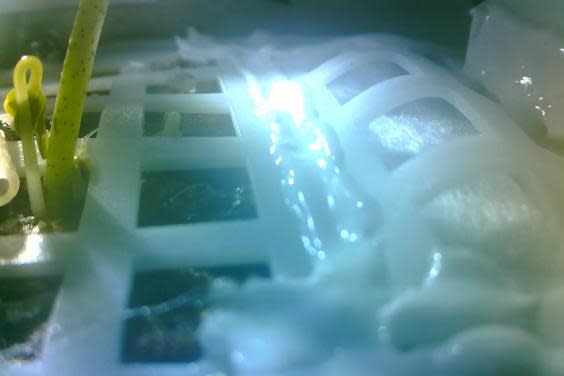First plants ever grown on moon have now died, says Chinese scientist
Just 24 hours after releasing photographs of the first ever plants grown on the moon, China has revealed the tender green shoots are now all dead.
The cotton plants had been the only seeds to sprout inside their aluminium container, known as a “moon surface micro-ecological circle”, which cost more than 10 million yuan (£1.15m). But the probe is now in lunar night, and temperatures have fallen too low for life to survive.
The Chang’e-4 probe, which landed on the far-side of the moon on 3 January, apparently entered “sleep mode” on Sunday as the first lunar night after the probe’s landing fell, Professor Xie Gengxin, chief designer of the experiment, told China’s Xinhua state news agency.
“Life in the canister would not survive the lunar night,” Professor Xie said.
It is not clear why, if the Chinese space agency knew the falling of the lunar night would kill the plants on Sunday, their death was not announced along with the successful germination of the seeds on Tuesday.
Other reports have suggested the pod was supposed to last three months and create a self-sustaining environment for life away from our planet.
The South China Morning Post even said the China National Space Administration planned to broadcast such an experiment in “less than a hundred days’ time”.
The moon lander was carrying soil, cotton seeds, rock cress, rapeseed and potato seeds, yeast and fruit fly eggs.
On Tuesday Professor Liu Hanlong of Chongqing University, who led the research, said the rapeseed and potato seeds had also germinated, but the cotton seeds were first to sprout, according to the South China Morning Post.

Cotton plants seen sprouting on the left hand side of the picture are the first seeds to germinate on the Moon (AFP/Getty )
“We have given consideration to future survival in space. Learning about these plants’ growth in a low-gravity environment would allow us to lay the foundation for our future establishment of space base,” Mr Liu said.
The report gave no indication the plants had already all died.
It also said the 3kg aluminium container was designed to maintain a temperature of between 1 and 30 degrees, allow in natural light and feed the plants with water and a nutrient solution.
It did not add that when lunar night fell, its contents would all be killed.
The experiment was in part designed to provide an indication of how lengthier space voyages could maintain food sources for astronauts without them having to return to Earth for supplies.

 Yahoo News
Yahoo News 